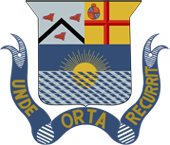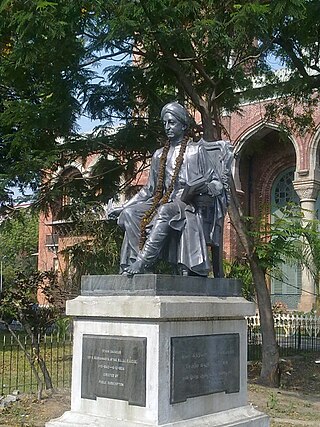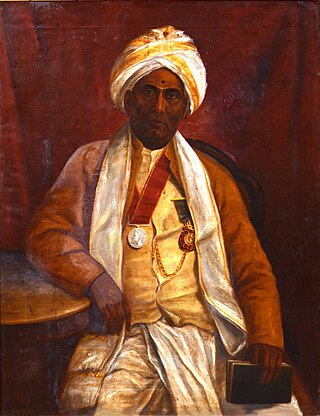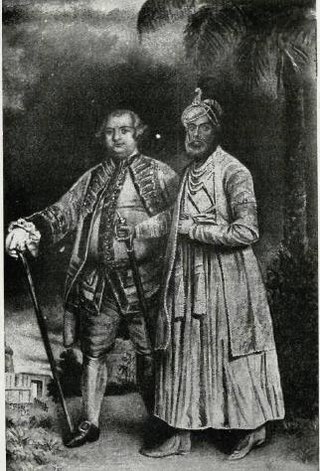Related Research Articles

Justice Vaidyanathapuram Rama Iyer Krishna Iyer was an Indian judge who became a pioneer of judicial activism. He pioneered the legal-aid movement in the country. Before that, he was a state minister and politician.

Presidency College is an art, commerce, and science college in the city of Chennai in Tamil Nadu, India. On 16 October 1840, this school was established as the Madras Preparatory School before being repurposed as a high school, and then a graduate college. The Presidency College is one of the oldest government arts colleges in India. It is one of two Presidency Colleges established by the British in India, the other being the Presidency College, Kolkata.
The chief instrument through which judicial activism has flourished in India is public interest litigation (PIL) or social action litigation (SAL). It refers to litigation undertaken to secure public interest and demonstrates the availability of justice to socially-disadvantaged parties and was introduced by Justice P. N. Bhagwati and Justice V.R. Krishna Iyer. It is a relaxation on the traditional rule of locus standi. Before 1980s the judiciary and the Supreme Court of India entertained litigation only from parties affected directly or indirectly by the defendant. It heard and decided cases only under its original and appellate jurisdictions. However, the Supreme Court began permitting cases on the grounds of public interest litigation, which means that even people who are not directly involved in the case may bring matters of public interest to the court. It is the court's privilege to entertain the application for the PIL.

Dewan Bahadur Sachivottama SirChetput Pattabhiraman Ramaswami Iyer, popularly known as Sir C. P., was an Indian lawyer, administrator and statesman, acknowledged as the most powerful man in the Madras Presidency in the decades immediately prior to Indian Independence.

Dr. Ambedkar Government Law College, commonly known by its former name Madras Law College, is a law school, located in Chennai (Madras), Tamil Nadu, India. It is also referred to as Government Law College or GLC, Chennai. It was established in 1891. It was renamed in 1990, as Dr. Ambedkar Government Law College, by the Government of Tamil Nadu in commemoration of the birth centenary of B. R. Ambedkar. In 1997, the Government of Tamil Nadu passed an Act which brought the college under the wings of the newly established Tamil Nadu Dr. Ambedkar Law University, splitting the college from the University of Madras.

Seshadri Srinivasa Iyengar CIE, also seen as Sreenivasa Iyengar and Srinivasa Ayyangar, was an Indian lawyer, freedom-fighter and politician from the Indian National Congress. Iyengar was the Advocate-General of Madras Presidency from 1916 to 1920. He also served as a member of the bar council from 1912 to 1920, the law member of Madras Presidency from 1916 to 1920 and as the president of the madras province Swarajya Party faction of the Indian National Congress from 1923 to 1930. Srinivasa Iyengar was the son-in-law of renowned lawyer and first Indian Advocate-general of Madras, Sir Vembaukum Bhashyam Aiyangar. Iyengar's followers called him Lion of the South.

Konakuppakatil Gopinathan Balakrishnan is an Indian judge who served as Chief Justice of the Supreme Court of India and later the chairperson of the National Human Rights Commission of India. He was the first judge from Kerala to become the Chief Justice of the Supreme Court. His tenure lasting more than three years has been one of the longest in the Supreme Court of India. While being Chief Justice of Gujarat High Court, he was appointed the acting governor of Gujarat from 16 January 1999 to 18 March 1999. In 2010, he was conferred with an honorary doctorate by Cochin University of Science and Technology.

Sir Chettur Sankaran NairCIE was an Indian lawyer and statesman who served as the Advocate-General of Madras from 1906 to 1908, on the High Court of Madras as a puisne justice from 1908 to 1915, and as India-wide Education minister as a member of the Viceroy's Executive Council from 1915 until 1919. He was elected president of the 1897 Indian National Congress, and led the Egmore faction, opposing the Mylapore group.
Pai is a surname from coastal Karnataka, Kerala and Goa in India. It is found among Hindus of the Goud Saraswat Brahmin community, especially of Madhwa Section following either Kashi Math or Gokarna Matha.

Mandakolathur Patanjali Sastri was the second Chief Justice of India, serving in the post from 7 November 1951 to 3 January 1954.

Sir Subbier Subramania Iyer was an Indian lawyer, jurist and freedom fighter who, along with Annie Besant, founded the Home Rule Movement. He was popularly known as the "Grand Old Man of South India".

Sir Thiruvarur Muthuswamy Iyer was an Indian lawyer who, in 1877, became the first native Indian during the British Raj to be appointed as justice of the High Court of Madras, acting as Chief Justice in 1893.

Pralhad Balacharya Gajendragadkar was the 7th Chief Justice of India, serving from February 1964 to March 1966.

Madras Presidency was an administrative subdivision (presidency) of British India. At its greatest extent, Madras Presidency included much of southern India, including the present-day Indian State of Tamil Nadu, the Malabar region of North Kerala, Lakshadweep Islands, the Coastal Andhra and Rayalaseema regions of Andhra Pradesh, Undivided Koraput and Ganjam districts of Orissa and the Bellary, Dakshina Kannada, and Udupi districts of Karnataka. The presidency had its capital at Madras.
A private attorney general or public interest lawyer is an informal term originating in common law jurisdictions for a private attorney who brings a lawsuit claiming it to be in the public interest, i.e., benefiting the general public and not just the plaintiff, on behalf of a citizen or group of citizens. The attorney may, at the equitable discretion of the court, be entitled to recover attorney's fees if they prevail. The rationale behind this principle is to provide extra incentive to private attorneys to pursue suits that may be of benefit to society at large. Private attorney general suits are commonly, though not always, brought as class actions in jurisdictions that permit the certification of class action lawsuits.
The Besant v. Narayaniah Case is a suite filed by Jiddu Narayaniah, father of J. Krishnamurti in 1912 against theosophist Annie Besant for the custody of his son. The case argued for Narayaniah by C. P. Ramaswami Iyer was won by him and was a cause célèbre of the time though Besant later appealed to the Privy Council of the United Kingdom and got a ruling in her favour. Besant and C.P. Ramaswami Iyer who were in opposing camps during the trial eventually became friends after the case got over and jointly participated in the Home Rule Movement.

Chetput Ramaswami Iyer Pattabhiraman was an Indian lawyer and politician from the Indian National Congress. He was the eldest son of Indian statesman C. P. Ramaswami Iyer. He served as a Member of Indian Parliament from Kumbakonam from 1957 to 1967 and as a Union Minister from 1966 to 1967.
Guna Vasantha Pai was a Senior Advocate of the Madras High Court and Indian Supreme Court, a freedom fighter, activist and a member of the Tamil Nadu Legislative Council (MLC). He is best known for filing one of the first public interest litigations against the then sitting Chief Justice of the Madras High court S. Ramachandra Iyer after Pai found evidence that the judge had forged his date of birth to avoid compulsory retirement at the age of 60 and the judge's younger brother sent invitations to celebrate his 60th birthday. This led the then Chief Justice of India P. B. Gajendragadkar to ask Ramachandra Iyer to resign as the case would severely damage the judiciary and he resigned before the case came up for hearing. This led the case to be dismissed as he had resigned. He was elected to the Tamil Nadu Legislative Council and he refused to take oath from the then pro-tem chairman, Abdul Wahab as he had advocated secession and swore himself as a legislator. His oath was upheld by the Madras High Court.

The High Court of Judicature at Madras is a High Court located in Chennai, India. It has appellate jurisdiction over the state of Tamil Nadu and the union territory of Puducherry. It is one of the oldest high courts of India along with Calcutta High Court in Kolkata and Bombay High Court in Mumbai. The Madras High Court is one of four charter high courts of colonial India established in the four Presidency Towns of Madras, Bombay, Allahabad and Calcutta by letters patent granted by Queen Victoria, dated 26 June 1862. It exercises original jurisdiction over the city of Chennai, as well as extraordinary original jurisdiction, civil and criminal, under the letters patent and special original jurisdiction for the issue of writs under the Constitution of India. Covering 107 acres, the court complex is one of the largest in the world, second only to the Supreme Court of the United Kingdom. The four-storey administrative building attracts hundreds of litigants every day.
Sir Srinivas Varadachariar was an Indian jurist who was the first Indian chief justice of the Federal Court of India when he served as the acting chief justice of the court between 25 April 1943 and 7 June 1943. He was also a judge of the Madras High Court and of the Federal Court of India. Varadachariar headed the ad-hoc committee of the Constituent Assembly of India, which drafted the provisions to set up the Supreme Court of India.
References
- ↑ "The Honourable Chief Justices". Madras High Court. Archived from the original on 12 February 2012. Retrieved 29 August 2014.
- ↑ "Vasantha Pai: an advocate's advocate". The Hindu . 16 February 2009. Archived from the original on 21 February 2009.
- ↑ "Timing of Katju's allegations needs to be questioned". Rediff. 23 July 2014. Retrieved 5 October 2015.
- ↑ "Contempt Law and Human Rights". The Hindu . 10 March 2001. Retrieved 9 September 2021.
- ↑ "The controversy over age... then and now". The Hindu . 29 January 2012. Retrieved 8 April 2015.
- ↑ G. Vasantha Pai vs Sri S. Ramachandra Iyer, 2MLJ151 (1967).
- ↑ Albuquerque, Olav (29 April 2022). "PIL jurisprudence needs to undergo a change, writes Olav Albuquerque". Free Press Journal. Retrieved 14 April 2024.